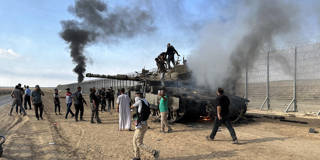
Hubris Meets Nemesis in Israel
By ruling out any political process in Palestine and boldly asserting that “the Jewish people have an exclusive and inalienable right to all parts of the Land of Israel,” Prime Minister Binyamin Netanyahu’s fanatical government made bloodshed inevitable. But that doesn't explain Israel's failure to prevent Hamas from attacking.
TOLEDO – Sooner or later, Israeli Prime Minister Binyamin Netanyahu’s destructive political magic, which has kept him in power for 15 years, was bound to usher in a major tragedy. A year ago, he formed the most radical and incompetent government in Israel’s history. Don’t worry, he assured his critics, I have “two hands firmly on the steering wheel.”